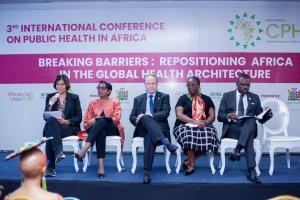Accelerating action for HPV vaccination in Africa
Lusaka – In an effort to reinforce the fight against cervical cancer in Africa, World Health Organization (WHO) and partners are supporting countries to scale up vaccination against the human papillomavirus (HPV), which is responsible for nearly all cases of cervical cancer.
So far, 27 African countries have introduced HPV vaccines in their national immunization programmes, and 34 have started cervical cancer screening programmes, with 14 using human papillomavirus deoxyribonucleic acid testing (HPV DNA) – a more effective method in detecting and preventing the disease compared with other commonly used screening.
At the 3rd International Conference on Public Health in Africa (CPHIA 2023), in Lusaka, Zambia, WHO convened a side-event where stakeholders called for the scaling up of the single-dose HPV vaccine to accelerate progress in eliminating cervical cancer in Africa. The aim of the side-event was to review the current state and future strategies for cervical cancer prevention and treatment on the continent.
“We must embrace innovation to revolutionize our approach to cervical cancer prevention. This includes adopting WHO’s one-dose vaccine schedule,” said Dr Matshidiso Moeti, WHO Regional Director for Africa.
In 2022, WHO’s Strategic Advisory Group of Experts on Immunization concluded that a single-dose HPV vaccine delivers solid protection against HPV comparable to two-dose schedules.
The African countries that have introduced the HPV vaccine had by 2022 delivered the first dose to 33% of girls aged 9–14. Plans to switch to a single-dose regimen in 16 African countries signify progress, but equitable access in West and Central Africa remains a priority.
Along with partners including WHO and UNICEF, Gavi, the Vaccine Alliance, is aiming to reach 86 million adolescent girls in low- and middle-income countries over the next three years with the HPV vaccine.
Speakers at the WHO side-event also emphasized the need to strengthen advocacy, particularly on the urgent for community involvement in vaccination efforts.
“Get local communities engaged to promote vaccination, as CSO's play a large role,” noted David Marlow, Interim CEO of Gavi, the Vaccine Alliance, highlighting the importance of community engagement in vaccination efforts.
Dr Jean Kaseya, Director-General of the Africa Centres for Disease Control and Prevention, emphasized the importance of including boys in HPV vaccination programmes as part of a comprehensive strategy to combat HPV and cervical cancer.
Harnessing advocacy, concentrating on integrating services, and fostering partnerships will expedite the provision of HPV vaccine services to this vulnerable group. Cervical cancer can be prevented and cured; this requires a range of interventions, from vaccines to treatment.



